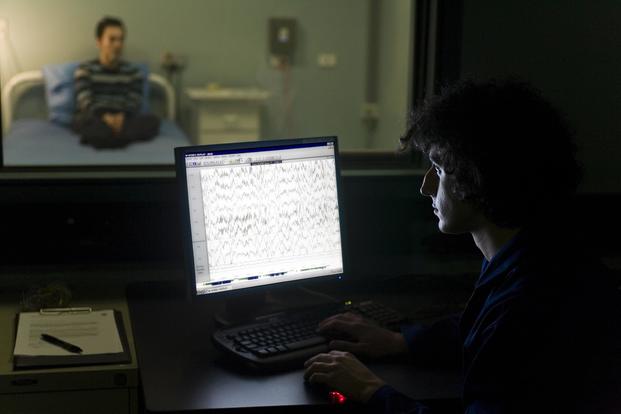While the collisions of the destroyers USS Fitzgerald and USS John S. McCain with commercial ships in separate deadly incidents last year were determined to be the result of human error, sleep deprivation was cited in the Navy's investigation of the incidents.
As a result, ONR has sponsored new research by Professor Sean Drummond at the Monash Institute of Cognitive and Clinical Neurosciences in Australia, an academic organization dedicated to understanding the brain and mind, including attention, memory and sleep.
"Loss of shut-eye is more than just an inconvenience. It disrupts human circadian (24-hour) rhythms, erodes physical and mental performance, and dulls decision-making abilities," a statement from ONR said.
The Navy collision report states, "The command leadership allowed the schedule of events preceding the collision to fatigue the crew."
The report describes errors that, in many instances, could be directly attributed to sleep deprivation.
The USS Fitzgerald collision report states that ship watch teams demonstrated a "lack of adherence to sound navigational practices."
Navy leaders were also deemed culpable for failing to "adhere to well-established norms of basic contact management."
Lack of procedural compliance was also specified as a key cause in the McCain collision.
"Both of these accidents were preventable, and the respective investigations found multiple failures by watch standers that contributed to the incidents," said Chief of Naval Operations Adm. John Richardson upon release of the study's findings. "We must do better."
While the collision investigation specifically cites fatigue as one of the causes, an ONR official told Military.com that sleep deprivation is something the Navy has explored for many years.
"Sleep deprivation is not new. With this study, we are thinking of sailors as well as Marines in Afghanistan," Robert Freeman, ONR spokesman, said in an interview.
ONR officials say Drummond will be the first to evaluate how such deprivation affects people's decision-making capabilities within social and group settings.
The results from the investigation into the collisions specifically cite a need for additional training, as well as extended research into a host of factors, including the impact of sleep deprivation upon mental performance and decision-making in particular.
The Navy has long been known for expecting, and in some cases pressuring, sailors to function with little sleep. A recent Government Accountability Office report, citing a 2014 Navy study, found sailors deployed aboard ships can work up to 100 hours per week, a finding highlighted by Senate Armed Services Committee Chairman John McCain, R-Ariz., in calling for change to service practices.
Freeman said much of the research was done in Australia and that the Navy will review results with a mind to making recommended changes. Research is still ongoing.
For the research, test subjects wear eye-tracking devices to assess mental attentiveness while watching computer screens. They are analyzed according to how they are able to sustain mental focus when exposed to distractions, according to ONR.
Participants also wear electroencephalogram (EEG) headsets to measure activity in the cerebral cortex, which is crucial to memory, attention and perception, ONR said.
Test participants are tasked with analyzing a range of circumstances and making decisions after having circadian rhythms disrupted by sleep deprivation. The assessment will ultimately test their ability to organize sources of information and outline the reasoning behind decisions.









